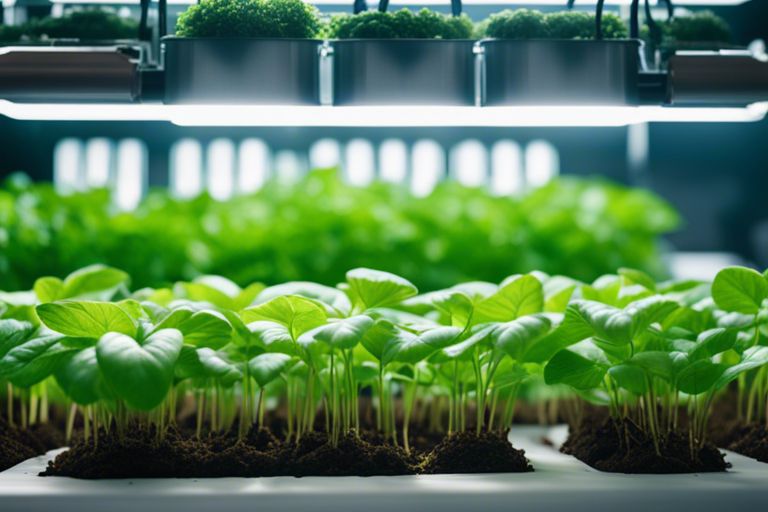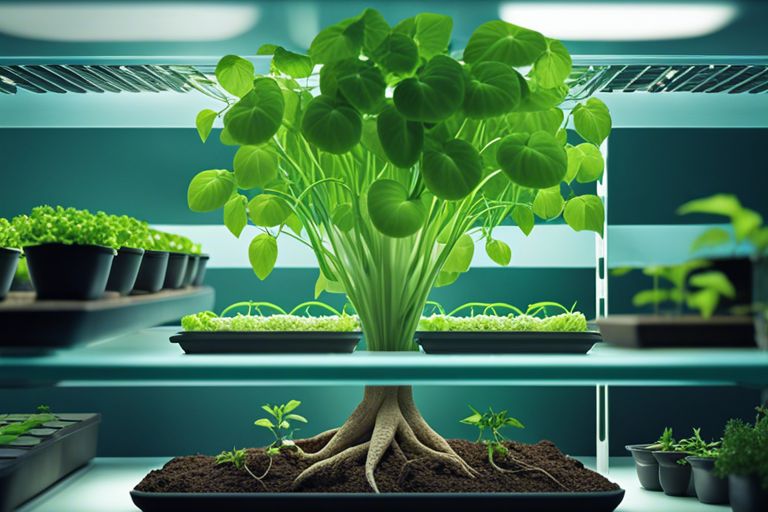Hydroponic gardening offers an efficient way to grow plants without soil, but ensuring optimal nutrient uptake is crucial for the health and success of your crops. In this guide, we will explore key strategies and techniques to help you maximize the nutrient absorption in your hydroponic system. From maintaining proper pH levels to choosing the right nutrient solution, we will cover everything you need to know to boost plant growth and yield in your hydroponic garden. Whether you are a beginner or an experienced hydroponic enthusiast, these tips will help you optimize nutrient uptake and take your garden to the next level.
Key Takeaways:
- Proper pH levels: Maintaining the correct pH range (5.5-6.5) is crucial for optimal nutrient uptake in hydroponic gardens.
- Adequate aeration: Good aeration in the nutrient solution helps oxygenate plant roots, facilitating nutrient absorption.
- Consistent nutrient dosing: Providing a balanced and consistent nutrient solution will ensure that plants receive the necessary elements for growth.
- Regular monitoring: Regularly check and adjust nutrient levels, pH, and aeration to prevent deficiencies or toxicities in your hydroponic system.
- Proper lighting: Providing the right spectrum and intensity of light is crucial for photosynthesis, which aids in nutrient uptake and overall plant health.

Getting Started with Hydroponics
Even if you are new to hydroponic gardening, there are ample resources available to help you get started on the right foot. One valuable resource is the Hydroponic Growing with Silica – A Comprehensive Guide, which can provide you with imperative information on how to optimize your nutrient uptake in your hydroponic garden.
Choosing the Right System
System selection is a crucial step in setting up your hydroponic garden. Consider factors such as space availability, budget, and your level of expertise. Some popular hydroponic systems include Deep Water Culture, Nutrient Film Technique, and Ebb and Flow. Choose a system that aligns with your gardening goals and resources to ensure successful nutrient uptake.
Selecting Quality Nutrient Solutions
The key to achieving optimal nutrient uptake in your hydroponic garden lies in the quality of the nutrient solutions you use. To maximize plant growth and health, invest in high-quality nutrient solutions that contain all the imperative elements your plants need to thrive. Look for solutions that are specifically formulated for hydroponic systems and ensure they are free from contaminants that could negatively impact plant growth. Conduct thorough research and choose reputable brands to guarantee the success of your hydroponic garden.
Factors Influencing Nutrient Uptake
Some key factors that influence nutrient uptake in your hydroponic garden include:
- pH levels
- Temperature
- Oxygenation levels
- Nutrient concentration
The Importance of pH Levels
Influencing nutrient uptake, pH levels play a crucial role in ensuring your plants can absorb the necessary nutrients. Optimal pH levels help prevent nutrient deficiencies and ensure maximum uptake efficiency.
Temperature and Oxygenation Considerations
Influencing the nutrient uptake process, it’s important to consider temperature and oxygenation levels. Maintaining the right temperature and oxygenation levels in your hydroponic system is vital for the health and growth of your plants.
There’s
| Factors | Considerations |
| Temperature | Keep it consistent |
| Oxygenation | Ensure proper levels |
For instance, fluctuations in temperature can stress plants and lead to nutrient uptake issues. Low oxygenation levels can cause roots to suffocate and hinder nutrient absorption.

Tips for Optimizing Nutrient Delivery
Once again, optimizing nutrient delivery is crucial for the success of your hydroponic garden. To ensure your plants receive the right amount of nutrients, consider the following tips:
- Monitor nutrient levels regularly to avoid deficiencies or toxicities.
- Use a high-quality nutrient solution specifically formulated for hydroponic systems.
- Adjust pH levels to maximize nutrient availability to plants.
- Ensure proper water circulation and aeration to prevent nutrient buildup.
Recognizing these key factors will help you achieve optimal nutrient uptake in your hydroponic garden.
The Role of Nutrient Cycling
Clearly, nutrient cycling plays a vital role in maintaining a healthy hydroponic system. By recirculating and reusing the nutrient solution, you can promote plant growth while minimizing waste. This sustainable practice also helps in saving resources and reducing environmental impact.
Balancing Macronutrients and Micronutrients
Little adjustments in balancing macronutrients (such as nitrogen, phosphorus, and potassium) and micronutrients (like iron, manganese, and zinc) are crucial for plant growth and development. Imbalances can lead to nutrient deficiencies or toxicities, impacting the overall health of your plants. Understanding the specific needs of your crops and adjusting the nutrient solution accordingly is key to ensuring they receive the right balance of macronutrients and micronutrients.
Monitoring and Adjusting Your System
Keep your hydroponic system running smoothly by monitoring and adjusting it regularly. To ensure optimal nutrient uptake, it’s necessary to maintain the right balance of nutrients in your solution. For a comprehensive guide on nutrient solutions in hydroponics, check out Nutrient Solution For Hydroponics – The Ultimate Guide.
Testing and Interpreting Water and Plant Signs
Any successful hydroponic gardener knows the importance of testing the water regularly and observing plant signs. By testing the pH and EC levels of your nutrient solution, you can ensure that your plants are receiving the right nutrients in the right concentrations. Pay attention to plant signs like yellowing leaves or stunted growth, as these can indicate nutrient deficiencies or imbalances that need to be addressed.
When and How to Make Necessary Adjustments
Signs that your hydroponic system needs adjustments include changes in pH or EC levels, as well as visible symptoms in your plants. When you notice these signs, it’s crucial to act quickly to prevent any negative impact on your crop. Adjusting the pH and nutrient concentrations in your solution can help your plants thrive and maximize nutrient uptake.
Adjusting your hydroponic system based on regular monitoring and plant observations is key to achieving optimal nutrient uptake. Ignoring signs of imbalance or deficiency can lead to poor plant growth and lower yields. Stay proactive and make the necessary adjustments promptly to keep your hydroponic garden healthy and productive.
Conclusion
Following this comprehensive guide on how to achieve optimal nutrient uptake in your hydroponic garden will ensure that your plants receive all the important elements they need to thrive. By maintaining proper pH levels, using quality nutrient solutions, monitoring plant health, and adjusting nutrient levels as needed, you can create the perfect growing environment for your hydroponic plants. Taking the time to understand the nutrient requirements of your specific crops and following these best practices will lead to healthier plants, increased yields, and overall success in your hydroponic gardening endeavors.
FAQ
Q: What is nutrient uptake in hydroponic gardening?
A: Nutrient uptake in hydroponic gardening refers to the process in which plants absorb imperative nutrients from the nutrient solution provided in the hydroponic system to support their growth and development.
Q: Why is achieving optimal nutrient uptake important in a hydroponic garden?
A: Achieving optimal nutrient uptake is crucial in a hydroponic garden as it directly impacts the overall health, growth, and productivity of the plants. Ensuring plants receive the right balance of nutrients leads to better yields and quality of produce.
Q: How can I monitor nutrient uptake in my hydroponic garden?
A: You can monitor nutrient uptake in your hydroponic garden by regularly testing the nutrient levels in the solution using a pH meter and a TDS (Total Dissolved Solids) meter. This will help you maintain proper nutrient balance for the plants.
Q: What are some tips to enhance nutrient uptake in a hydroponic system?
A: To enhance nutrient uptake in a hydroponic system, ensure that pH levels are within the optimal range for the type of plants you are growing, maintain proper aeration of the nutrient solution, and regularly flush and replace the solution to prevent nutrient imbalances.
Q: How can I troubleshoot nutrient uptake issues in my hydroponic garden?
A: If you encounter nutrient uptake issues in your hydroponic garden such as yellowing leaves or stunted growth, check the nutrient solution pH and TDS levels, adjust as needed, inspect for root rot or pests, and make sure the plants are receiving adequate light and water.
